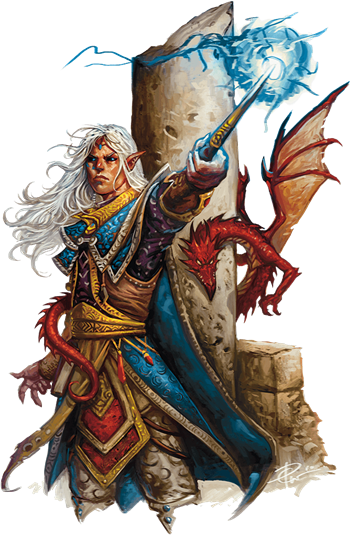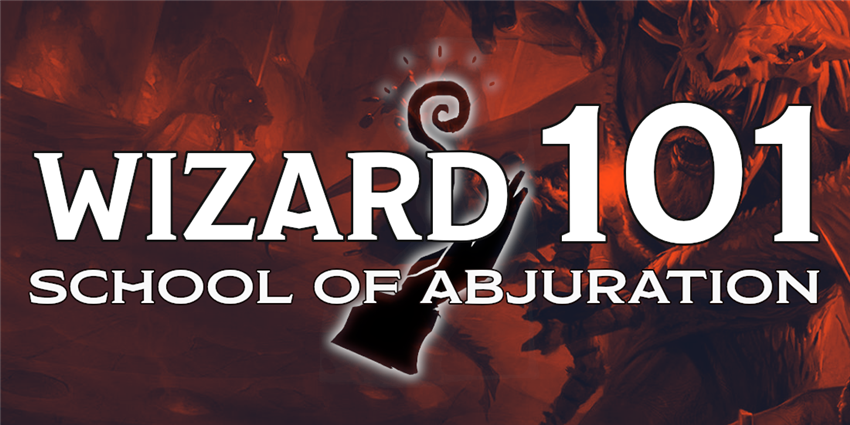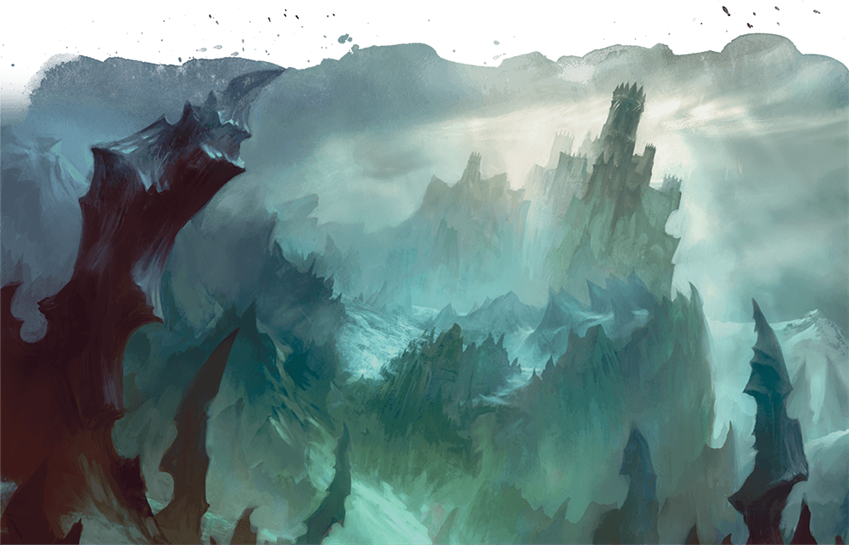 Class is back in session. This week, we explore an oft-forgotten side of the wizardly arts: the ability to protect others with magic, rather than destroying them. Clerics and druids are well known for healing magic, but wizards who study the magical school of abjuration know that no amount of healing is comparable to an impenetrable defense. Abjurers create arcane wards to protect against physical harm, protect against scrying, and hold shut doors that were never meant to be opened.
Class is back in session. This week, we explore an oft-forgotten side of the wizardly arts: the ability to protect others with magic, rather than destroying them. Clerics and druids are well known for healing magic, but wizards who study the magical school of abjuration know that no amount of healing is comparable to an impenetrable defense. Abjurers create arcane wards to protect against physical harm, protect against scrying, and hold shut doors that were never meant to be opened.
We’ve completed our first full rotation of the twelve classes, and exhausted all the content that the Basic Rules have to offer—as far as classes go, that is. This next wave of the Class 101 series will appraise every subclass within the Player’s Handbook and break down each subclass’s strengths, weaknesses, thematic elements, and everything else a player would want to know before playing that subclass. Because of this, you will need to own the Player’s Handbook (or purchase the subclass a la carte on the Marketplace) in order to make full use of this series.
Check out the other guides in the Class 101 series, like the broad overview of the wizard class in Wizard 101: A Beginner’s Guide to the Arcane Arts, and Wizard 101: School of Evocation. If you’re interested in playing other classes, check out the entire Class 101 series.
Story of the School of Abjuration
The diviner opened his eyes, and his scrying spell dissipated. He peered through the night’s gloom at the abjurer who stood beside him atop the castle’s battlements, a grim expression on his face. “Raiders,” he spat. “I see the usual bandit scum, but it seems they’ve brought the local goblin warlords under their banner. They’re moving through the night, and they’ll be here before dawn.”
The abjurer shook her head, her silver curls falling over her age-lined face. “Then we need to start the evacuation now. Send a message to the master conjurer and tell him to get the students away from here, and get as many evokers up here as you can. As for the defenses, leave them to me.” She strode away boldly towards the battlements overlooking the castle’s portcullis. The diviner cast a spell of sending and hurriedly barked an order into the air.
Hours later, dawn stretched its first rosy talon above the mountainous horizon. With the first light of dawn came the sound of battle songs and war chants winding through the foothills. The abjurer stood alone outside the castle’s portcullis. A hundred-foot long bridge of stone stretched out before her, spanning the canyon that separated the castle’s main gate from the advancing army. She looked up at the battlements, pointed at one of the commander of the evokers standing atop it, and whispered a short message that reached his ears. “Once they reach the bridge, fire at will until they reach the middle. Then flee, and cover our escape.”
The commander nodded, and the abjurer turned back towards the advancing army as dozens of bolts of magical flame shot past her, scorching the front ranks of the enemy. “Come no farther,” bellowed the abjurer, “For whatever violence you bring to the gates of this castle will be returned upon you tenfold!”
The raiders looked to their commander, a scar-faced hobgoblin with a tiny, squashed nose. He snorted and grinned a wicked, jack-o-lantern grin. “Advance,” he grunted. “Break through, and you may claim whatever treasure you find.”
The raiding army charged forward, shields raised against the hail of evocations that rained down upon them. Fire, ice, acid, and lightning felled bandit after bandit, but another would always surge forth to take the place of the fallen. Then, they reached the center of the bridge. No raider heard her words, but she spoke to herself with quiet triumph, “I prepared explosive runes.”
A quartet of runic glyphs of warding flared to life beneath the raiders’ feet, then exploded in cacophonous unison. Screams echoed throughout the canyon as sixty feet of centuries-old stone bricks in the center of the bridge exploded and tumbled into the gully, taking dozens of screaming bandits and twice as many blackened corpses with them. When the smoke cleared, the hobgoblin snarled to himself as the rest of the bridge slowly crumbled away, stranding him on the wrong side of the castle. The abjurer was nowhere to be seen; only the last wisps of her misty step could be seen as they faded away.
School of Abjuration Features
Abjurers are masters of warding magic, which can protect others, negate spells, or even create deadly magical traps. Their mastery of abjuration magic grants them the ability to use leftover energy from their spells to construct magical wards that protect against incoming damage. The wizard gains five subclass features at 2nd, 6th, 10th, and 14th level. You can read all of the School of Abjuration features in the Player’s Handbook. In summary, your subclass features allow you to:
- Study abjuration spells more efficiently, halving the time and cost of copying such spells into your spellbook.
- Weave the power of your abjuration spells into an arcane ward that protects you from harm.
- Extend your arcane ward to protect nearby creatures.
- Gain an increased ability to dispel and counteract magic.
- Become able to shrug off magic with ease, and even resist damage from spells.

Benefits of the School of Abjuration
Abjurers are masters of defensive magic, and their class features reflect this. The Arcane Ward feature starts out quite powerfully at early levels, as those extra couple of hit points can be the difference between life and death at the hands of a goblin’s blade. Even though its defensive abilities can’t keep up with skyrocketing character hit points and monster damage values at higher levels, the ability to choose who benefits from the ward gives you extra tactical options during combat. Getting free hit points while casting your signature spells is never a bad thing. And on top of that, damage absorbed by your arcane ward doesn't affect your hit points. This may seem obvious, but what's less obvious is that taking damage in this way doesn't require you to make a saving throw to maintain concentration on a spell you're concentrating on.
Speaking of signature spells, the spells you gain the ability to cast at-will through the 18th-level wizard feature Spell Mastery still fuel your ward, even though they don’t require you to spend a spell slot. This allows you to “top off” your ward between fights if you have the time to cast alarm four dozen times. This feels like an exploit, and your DM may forbid you from doing so, but encourage them to allow it. This sort of silly arcane loophole is exactly the sort of thing an eccentric master of wizardry would be delighted to figure out.
Once you reach 14th level, you gain advantage on all saving throws against spells and spells deal half damage to you. This makes you a truly incredible mage-killer, especially when lots of high-level foes—like rakshasas, spellcaster-variant dragons, mummy lords, death knights, and so forth—come with either spellcaster levels or innate spellcasting.
Drawbacks of the School of Abjuration
All of the abjurer’s subclass features are useful to a certain degree, making it hard to single out any obvious weaknesses. Even the more niche features, like the ability to make your counterspell and dispel magic spells more likely to succeed, can have campaign-altering effects. A clutch counterspell against a lich could be the difference between success and abject failure, after all.
The Arcane Ward feature encourages you to cast lots of abjuration spells. Regrettably, there just aren’t that many good abjuration spells available to wizards at 1st level. Mage armor sees frequent use, and shield is inefficient but potentially life-saving. Regrettably, it’s not until you reach 5th level and gain access to spells like counterspell and glyph of warding that your preferred spell school really comes alive. This makes Arcane Ward even harder to use effectively. Getting two extra hit points for free when you cast mage armor at the start of the day is nice at 1st level, but it doesn’t mean much later on. Treat Arcane Ward as a neat bonus, and don’t worry too much about making the most efficient use of it as you can.
The abjurer isn’t the most exciting wizard subclass, mostly because its subclass features aren’t surprising, shocking, or even particularly awe-inspiring, like some other wizard subclass features are. Nevertheless, wizards who study the School of Abjuration are powerful workhorses, even if they aren’t as glitzy as conjurers, enchanters, or evokers.

Suggested Build
As a wizard, you choose your Arcane Tradition at 2nd level. This gives you a little bit of time to feel out what you want your playstyle to be before you select your preferred subclass. You find that your spells feel a little lackluster at 1st level, since you only have two 1st-level spell slots to use before falling back on your cantrips. Even using your Arcane Recovery feature to get one 1st-level slot back during a short rest, you’ll might feel that your cantrips are the star of the show.
You should choose a race that improves your Intelligence score, and either your Dexterity or Constitution scores. As a wizard, Intelligence is your most important ability. Your spells are powered by your own knowledge of the arcane workings of magic, and improving this understanding makes it easier for you to hit with spell attacks and harder for enemies to save against your spells. As such, gnomes make fantastic wizards, as their innate intellect makes them natural studies. High elves also make excellent wizards, as they gain a natural bonus to both Dexterity and Intelligence, and also grant you an extra cantrip. Variant humans also have a good time as wizards; gaining a free feat is nothing to sneeze at.
Choose EQUIPMENT instead of GOLD at the end of character creation. Since you’ll probably be choosing at least one ranged damage-dealing cantrip, you can take a quarterstaff so that you have a little bit of protection up-close. Choosing a component pouch or an arcane focus is a purely aesthetic choice, and choosing a scholar’s or an explorer’s pack is a fairly insignificant decision. A scholar’s pack will be useful in a more city-based campaign, but if you plan on traveling cross-country, then an explorer’s pack will be superior.
Spells
Wizards can copy so many spells into their spellbook that you don’t have to be too choosey when selecting your spells at each level. Nevertheless, it couldn’t hurt to make very clear choices, especially if your DM doesn’t give out a lot of spell scrolls to copy, or doesn’t pit you against many other enemy wizards with spellbooks to steal. As a 1st-level wizard, your spellbook starts with six spells in it, and you can prepare a number of spells equal to Intelligence modifier + your wizard level (minimum of one spell). Don’t forget that all of these spells must come from the wizard spell list. You also start play with 3 cantrips, also from the wizard spell list. You gain two new wizard spells every level, and you also gain new cantrips from time to time, so keep an eye on the Wizard Table when you gain a new level.
As an abjurer, you’ll want at least two spells marked DEFENSE, one spell marked either OFFENSE, and one spell marked either SOCIAL or SUPPORT, depending on how you want to play your character. Spells on this list from the abjuration school are also noted, since they can be used to power up your Arcane Ward when you choose this subclass at 2nd level.
Note that this list only includes some spells from the Player's Handbook, so if you want to choose more unusual spells, or have other sources like Xanathar's Guide to Everything, you'll have to do a little self-directed research. This list is just here to get you started if this is your first time playing an abjurer.
- Burning hands (OFFENSE)
- Charm person (SOCIAL)
- Color spray (DEFENSE)
- Detect magic (EXPLORATION)
- Disguise self (SOCIAL)
- Find familiar (OFFENSE/EXPLORATION)
- Mage armor (DEFENSE; abjuration)
- Protection from evil and good (DEFENSE; abjuration, but note that its material component, holy water, costs 25 gp to purchase)
- Shield (DEFENSE; abjuration)
- Thunderwave (OFFENSE)

Feats
At 4th level, you get to gain either an Ability Score Increase or a feat. Choosing an Ability Score Increase lets you increase one ability score by +2 (such as increasing your Intelligence score from 16 to 18) or increase two ability scores by +1 (like increasing your Intelligence from 15 to 16 and your Dexterity score from 13 to 14). Increasing your ability scores makes you better at a wide variety of things; for instance, increasing your Intelligence score makes it easier to hit with your spell attacks, make it easier to succeed on the checks required by counterspell and detect magic, and also make it harder for enemies to resist your spells that require saving throws.
Feats, on the other hand, give you a special ability that could be more helpful in a specific circumstance, as opposed to the broad improvement that an Ability Score Increase could give you. Intelligence is your most important ability score, since it governs your ability to hit with attacks. Once you’ve increased your Intelligence score to 20 (its maximum value), or even just to 18 (a pretty good value), you may want to choose a feat. You can choose any feat you want to support your character concept, but there are some feats that may be more useful to your character than others.
Abjurers don’t have any feats that they desperately want, so focus mainly on improving your Intelligence score. Some feats like Keen Mind and Observant can give you a fun character quirk while still giving you a minor boost to your Intelligence, but don’t pick these unless they support your character concept.
The Class 101 series is taking a brief hiatus as we reach the end of our second rotation. Never fear, we'll return to the rest of the subclasses in the Player's Handbook soon enough. If you want more advice for building a wizard, check out Wizard 101. Have you ever played an abjurer? What advice would you give to players that want to play this subclass?
 James Haeck is the lead writer for D&D Beyond, the co-author of Waterdeep: Dragon Heist, Baldur's Gate: Descent into Avernus, and the Critical Role Explorer's Guide to Wildemount, a member of the Guild Adepts, and a freelance writer for Wizards of the Coast, the D&D Adventurers League, and other RPG companies. He lives in Seattle, Washington with his fiancée Hannah and their animal companions Mei and Marzipan. You can find him wasting time on Twitter at @jamesjhaeck.
James Haeck is the lead writer for D&D Beyond, the co-author of Waterdeep: Dragon Heist, Baldur's Gate: Descent into Avernus, and the Critical Role Explorer's Guide to Wildemount, a member of the Guild Adepts, and a freelance writer for Wizards of the Coast, the D&D Adventurers League, and other RPG companies. He lives in Seattle, Washington with his fiancée Hannah and their animal companions Mei and Marzipan. You can find him wasting time on Twitter at @jamesjhaeck.








-
View User Profile
-
Send Message
Posted Jan 24, 2020Is anyone else just outright encouraged to go work on something D&D related after looking at almost ANY image in a D&D book?
-
View User Profile
-
Send Message
Posted Jan 24, 2020Yes.
-
View User Profile
-
Send Message
Posted Jan 24, 2020Love the OoTS reference!
-
View User Profile
-
Send Message
Posted Jan 24, 2020I love my abjurer. He has saved our Goliath paladin on many occasions.
-
View User Profile
-
Send Message
Posted Jan 24, 2020I really enjoy my Deep Gnome Abjurist with Svirfneblin Magic. You really get to use your ward effectively, topping off for free between battles by free castings of Nondetection. DM allows it as it took a feat to acquire, which is no small price. Also because it's too inefficient to recharge in combat and therefore not really exploitative. Bonus: Nobody can scry on me.
-
View User Profile
-
Send Message
Posted Jan 24, 2020Hopefully, the psionic abjuration spells will become official. Mental Barrier and Thought Shield would definitely be good for charging your Arcane Ward.
-
View User Profile
-
Send Message
Posted Jan 24, 2020Was that an OoTS reference?
Love it! Great article James!
-
View User Profile
-
Send Message
Posted Jan 24, 2020Literally just played a level 15 Abjurer today, coincidentally. I played as a Tortle and took War Caster and Resilient(Con). It worked pretty well, advantage and proficiency is nothing to sneeze at when you're trying to maintain concentration.
-
View User Profile
-
Send Message
Posted Jan 24, 2020A fun, single level Abjurer Multiclass: Warlock.
Why? For one spell in particular: Armor of Agathys. When you get hit by a melee attack, Armor of Agathys dishes the temp HP your earned from it back at the enemy, until the temp HP runs out. This spell works so well with the abjurer's Arcane Ward, as the ward takes damage before your temp HP, causing it to last longer than it otherwise would. It also doesn't use concentration, and lasts 10 minutes, letting you cast it before a fight without losing your ability to use useful spells that do require concentration.
Throw out a Flaming Sphere and control it with your bonus action while using your Action to cast Blade Ward to further your tankiness while still being a threat on the battlefield! Or go full on melee, casting Booming Blade up close and personal while making enemies think twice about moving away from you!
-
View User Profile
-
Send Message
Posted Jan 24, 2020Anyone else catch the Order of the Stick reference at the end of the story?
-
View User Profile
-
Send Message
Posted Jan 24, 2020" A clutch counterspell against a lich could be the difference between success and abject failure, after all."
huh, wonder why that sounds so familiar
-
View User Profile
-
Send Message
Posted Jan 24, 2020I love abjurers. Playing one currently.
-
View User Profile
-
Send Message
Posted Jan 24, 2020The ward has HP. I suppose this means it can recover HP via magic, but since it doesn't count as a creature, not every healing spell is going to apply. So what spells will count towards healing the ward?
-
View User Profile
-
Send Message
Posted Jan 24, 2020Any abjuration cast by the abjurer.
-
View User Profile
-
Send Message
Posted Jan 25, 2020Take a closer look at the class feature. The first time you cast an abjuration spell in a day, the ward appears twice your wizard level + your Intelligence modifier, then whenever you cast an abjuration spell again, it regains HP equal to twice the level of the spell. Then the ward disappears when you take a long rest.
-
View User Profile
-
Send Message
Posted Jan 25, 2020I get the conditions for it coming and going, but the text doesn't say that casting abjuration spells is the only way for it to regain HP. However, if it can't be targeted in any way, then it's a moot point.
-
View User Profile
-
Send Message
Posted Jan 25, 2020I disagree with carrying a nonmagical quarterstaff if you're a wizard. Strength is almost always a dump stat so your odds of hitting with it are low and your damage output won't be that great. If you need to carry a melee weapon, going with a dagger is better- your dexterity is likely to be fairly decent to deal with your lack of armor options.
Unless you want to play a Mountain Dwarf and wear a suit of scale mail.
Other than that, this is a pretty good write up. Abjurers are one of the stronger schools of wizardry.
-
View User Profile
-
Send Message
Posted Jan 25, 2020You're getting your order of operations wrong. You get 2x Wiz lvl + Int mod HP when you first cast an abjuration spell after a long rest. Then it heals only 2x spell lvl cast after it's taken damage. You also said that on the negatives of playing an Abjurer only having 2hp for the ward wouldn't be good. There's practically no way to have a ward start at 2hp since you get Arcane Ward at lvl 2 and that would be at minimum 4hp + whatever your Int mod is. Hell my Abjurer started with 7hp for his ward (2 x 2 + 3 Int mod. I had a 17 Int)
I also disagree that it doesn't help at higher lvls. I mean Wizards are notorious paper tigers who fall with the slightest breeze so anything keeping you up longer than normal is a godsend
-
View User Profile
-
Send Message
Posted Jan 25, 2020Just like to point out that a dwarf with the Mark of Warding gets +1 INT, +2 CON, an extra two abjuration spells per long rest, and Armor of Agathys added to their wizard spell list....
;)
-
View User Profile
-
Send Message
Posted Jan 25, 2020I would like to mention that with Arcane Ward you don't have to make concentration checks if the damage didn't get pass throu the ward. Also, the Arcane Ward reduce your effective Concentration DC check: if an enemy is attacking your wizard with 40 damage and your ward can absorb 20 of that, an eventual Concentration check get a DC 10 (40-20= 20 damage. Half of that is the DC for Concentration check, so 10).
Remember: for "concentration check" the only damage that count is the one the wizard take, and Arcane Ward take damage instead of the wizard. Reducing Concentration Check is a HUGE advantage for a wizard. For me that alone put the Abjuration school near the divination school in terms of power features.
I played an Abjuration wizard with high intelligence and constitution and warcaster feat. it was really damn difficult for my PG to loose concentration.